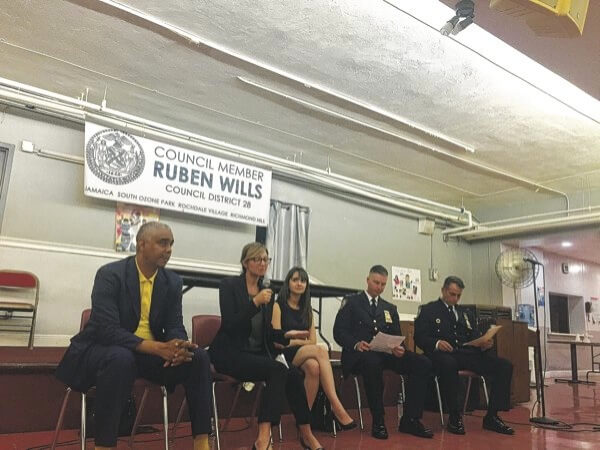By Patrick Donachie
Community members gathered in the basement of Calvary Baptist Church in Jamaica Tuesday night for a town hall meeting hosted by Councilman Ruben Wills (D-Jamaica) about the NYPD’s proposed pilot program for equipping officers with body cameras.
NYPD representatives said the cameras could act as a deterrent for police misconduct, but some in the community stressed that retraining cops and prosecuting officers who commit crimes were more important.
“We hope these cameras have a civilizing factor,” said Nancy Hoppock, the assistant deputy commissioner for the NYPD’s Risk Management Bureau. “Everyone’s watching and everyone knows they’re being watched, so maybe (misconduct) doesn’t happen.”
The program would include 1,000 officers in 20 different precincts and was mandated in a 2013 federal court ruling that found the department’s stop-and-frisk policy unconstitutional. Officers would have to turn the cameras on during any instance in which the officer is “engaging in investigative activity,” including use of force, arrests, summons, searches, stop-and-frisk situations and prisoner transportation.
During the town hall, attendees were given a questionnaire about their opinions of body cameras and the NYPD. Speakers expressed distrust about how the collected footage might be used and the discretion officers have in turning on the camera. According to the policy draft, officers have discretion as to whether or not a situation requires turning the cameras on. One audience member suggested that officers should have to keep the cameras on throughout the working day.
“The cost of keeping 36,000 cameras on 24/7 could bankrupt us,” Hoppock said.
Andrew Simpson, the youth director at the church, said videos from officer-involved shootings that were made public in the past had not stopped such incidents from occurring.
“We can produce our own videos, and they have been produced so many times, but it doesn’t make a difference,” he said. “Who do these cameras really protect?”
Another speaker questioned how the NYPD could police its own members even with the benefit of body cameras, and suggested that the Public Advocate’s office and the Civilian Complaint Review Board be allowed to provide stronger oversight.
“It behooves me that the Police Department would start the body camera process under its own roof,” the speaker said. “We don’t need cameras. What we do need is prosecutions.”
According to Hoppock, officers would not be able to alter or delete any footage. A sheet synopsizing the policy draft stipulates that officers are encouraged but not required to tell people when they are recording, but they do not need their permission to record. Hoppock stressed that the policy was in draft form and could change depending on the input from the surveys.
According to the draft policy, in a high-profile incident like an officer-involved shooting, the NYPD will “work with the attorney general or district attorney to decide whether it is possible to make the video public without harming a criminal investigation or interfering with a person’s right to a fair trial.”
Wills said the surveys would be available at police precincts in southeast Queens by the end of the week and they were hoping to get paper copies available in other areas. People can fill the survey out online at www.nypdb
“We’re not saying to get rid of your cell phones,” he said. “Use your cell phones.”
Reach reporter Patrick Donachie by e-mail at pdona






























